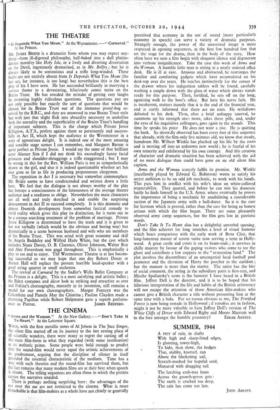THE CINEMA
" Arms and the Woman." At the New Gallery.—" Don't Take It To Heart". At the Leicester Square.
WHEN, with the first metallic notes of Al Jolson in The Jazz Singer, the silent film started off on its journey to the last resting place of all scientific wonders, there were many to regret the cutting off of the mute filrta-form in what they regarded (with some justification) as its atsthenc prime. Some people were bold enough to predict that the sound-film would never equal the artistic achievements of its predecessor,_ arguing that the discipline of silence in itself provided the essential characteristic of the medium. Time has a way with such theories and the sound-film has survived them, but the fact remains that many modern films are at their best when speech is absent. The telling sequences are often those in which the picture carries the narrative unaided.
There is perhaps nothing surprising here: the advantages of the eye over the ear are not restricted to the cinema. What is more remarkable is that film-makers as a whole have not dearly or generally
perceived that economy in the use of sound (more particularly economy in speech) can serve a variety of dramatic purposes. Strangely enough, the power of the unassisted image is more respected in opening sequences, in the first few hundred feet that set the stage for the drama, than in the body of the story. How often have we seen a film begin with eloquent silence and degenerate into verbose insignificance. Take the case this week of Arms and the Woman. A humble little man is sitting at a neatly ordered office desk. He is ill at ease. Anxious and abstracted, he rearranges the familiar and comforting gadgets which have accumulated on his desk-top over the years. He reaches instinctively for the corner of the drawer where his indigestion tablets will be found, carefully washing a couple down with the glass of water which always stands ready for this purpose. Then, fortified, he sets off on the long, agonising walk to the boss's office. But here his nerve fails. He is incoherent, stutters inanely that it is the end of the financial year, and is curtly informed that there are no rises. He withdraws defeated to his desk. Then, after a brief unhappy interval, he summons up his strength once more, takes three pills, and, under the eyes of his inquisitive colleagues, goes again to the assault. This time he speaks his piece He does not want a rise. He is quitting the bank. So shrewdly observed has been every foot of this sequence that already, with the film only five minutes old, we know that steady, humdrum Mr. Wilbert Winkle has plucked up his life by the roots and is moving off into an unknown new world ; he is fearful of his own temerity and exhilarated by his own 'courage. And this creation of character and dramatic situation has been achieved with the aid of no more dialogue than could have gone on an old silent film captiori,
Arms and the Woman scarcely fulfils its promise. Mr. Winkle (excellently played by Edward G. Robinson) wants to satisfy his secret ambition to be an odd job mechanic, to work with his hands. This puts him in conflict with his wife's ideas on white-collared respectability. They quarrel, and before he can win his domestic battle he finds himself in the U.S. Army, where eventually he proves the importance of being a mechanic by annihilating a considerable section of the Japanese army with a bull-dozer. So it is the case fOr heroism which is proved, rathet than the case for being an honest artisan with which the film began. There are some pleasantly observed army camp sequences, but the film gets lost in patriotic words.
Don't Take It To Heart also has a delightful unverbal opening, and the film achieves for long stretches a level of visual humour which bears comparison with the early work of Rene Clair, that long-lamented master of screen satire now serving a term in Holly- wood. A great castle and estate is on its beam-ends ; it survives in chilly majesty by favour of the gaping visitors who come to see the ghost and contribute a few coppers to the "restoration fund." The plot involves the discomfiture of an uncongenial local football pool promoter and the elevation of Harry the poacher to the earldom ; but the manner is more than the matter. The satire has the bite of social comment, the acting in the subsidiary parts is first-rate, and Mische Spoliansky's score is the funniest I have heard in a British film. Jeffrey Dell is the director, and it is to be hoped that his hilarious interpretation of the life and habits of the British aristocracy will not escape the attention of those American film-makers who cannot give a British character a title without presenting him at the same time with a halo. For no reason obvious to me, The Petrified Forest is now being remade in Hollywood ; if remakes are in fashion, might it not be more valuable to have Jeffrey Dell's version of The White Cliffs of Dover with Edward Rigby and Moore Marriott well
to the fore amongst the humble peasantry? EDGAR ANSTEY.


























 Previous page
Previous page